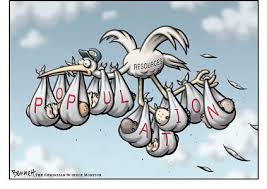Photo via overpop2013.weebly.com
This past August, NPR published a piece online titled “Should We Be Having Kids in the Age of Cli-mate Change?” The article outlines the principle goals and concerns of one Travis Rieder, a philosopher at the Berkman Institute of Bioethics at John Hopkins University. In the article he constructs a moral and ethical argument against having children (or more than one child, as Rieder has one of his own) due to the impending effects of climate change and the environmental impact of raising a child. In short, Reider’s argument relies on the difference between the metric tons of carbon dioxide saved by having one fewer child, 9,441 tons, compared to how much carbon can be saved by a lifetime (80 years) of employing conservation techniques like driv-ing less, using LED bulbs, and re-cycling, which amounts to 488 tons. Rieder proposes a sort of population engineering plan where “underdeveloped” countries can have more kids, but in wealthy countries having children would result in a progressive tax based on income. As a student here at St. Lawrence studying climate change and sociology, I naturally have a few thoughts on the subject and what I would do.
While admitting it is unlikely that this plan could be carried out, Rieder does want to control the population. He says it would be much more humane and just than China’s now revoked one child policy. Framing this as a women’s rights issue might be a good place to start. By telling women how many children they can have or taxing them heavily to de-crease the likelihood of them having children, one is targeting their fundamental reproductive rights. In the same way that I do not want kids but will not force this opinion on other people, nor should the government, or any governing institution, force their beliefs on women. In a country like the United States, where civil liberties have been taking a hit lately, the right to reproduce ought to remain on the list of untouchable issues.
The part of Rieder’s argument that I agree with is the indisputable fact that having fewer children would solve a lot of our problems. All of the little things we do (and I try and do as many as I can) are futile compared to not having children. We can recycle all the livelong day and promote sustainable and locally sourced food, but all this adds up to only about one sixteenth of the carbon that having a child creates. The bleak truth is that, especially as Americans, when we live, we pollute. And we pollute more per capita than all but seven countries, at 17.6 metric tons of carbon emitted each year.
So while I will not morally advocate for a government sponsored ban on having children, or even a progressive tax, I can state the case for voluntarily choosing not to have children, or choosing to have just one.
When choosing whether to have children, we take many things into account, including where we want to live, how we want to educate our children, and what environment we want them to grow up in. None of that will matter if we do not address climate change. Instead we will be worried about moving away from coastlines to escape rising sea levels and moving north to avoid severe drought and intense storms. We may do the little things to address climate change and may use the common defense of “if everyone did their part we would not have climate change,” but that is not true. As Americans, we are responsible for a good chunk of climate change, and that will not be reversed by recycling or turning off light bulbs once in a while. We need a radical and voluntary movement based on scientific logic and a desire to better our planet. As Rieder points out, reducing our population growth could reduce carbon emissions by one fifth, roughly the amount needed to move our planet away from the tipping point we are barreling towards. I am not saying it will be easy, but if we believe individual agency can drive us to do something about climate change, I suggest we at least reconsider having only one child, or none at all.



